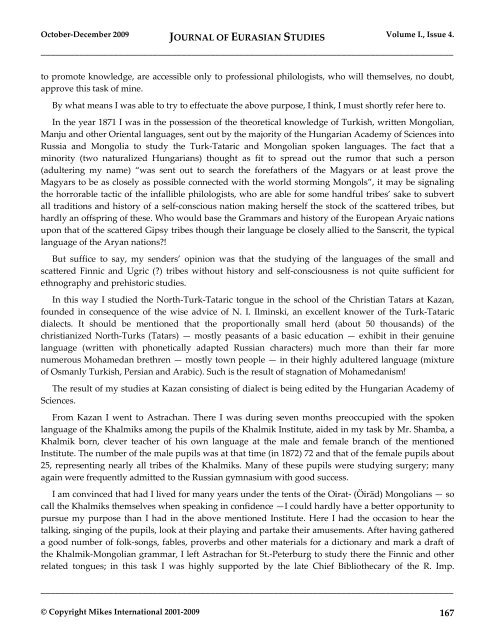JOURNAL OF EURASIAN STUDIES
JOURNAL OF EURASIAN STUDIES
JOURNAL OF EURASIAN STUDIES
You also want an ePaper? Increase the reach of your titles
YUMPU automatically turns print PDFs into web optimized ePapers that Google loves.
October-December 2009 <strong>JOURNAL</strong> <strong>OF</strong> <strong>EURASIAN</strong> <strong>STUDIES</strong> Volume I., Issue 4.<br />
_____________________________________________________________________________________<br />
to promote knowledge, are accessible only to professional philologists, who will themselves, no doubt,<br />
approve this task of mine.<br />
By what means I was able to try to effectuate the above purpose, I think, I must shortly refer here to.<br />
In the year 1871 I was in the possession of the theoretical knowledge of Turkish, written Mongolian,<br />
Manju and other Oriental languages, sent out by the majority of the Hungarian Academy of Sciences into<br />
Russia and Mongolia to study the Turk-Tataric and Mongolian spoken languages. The fact that a<br />
minority (two naturalized Hungarians) thought as fit to spread out the rumor that such a person<br />
(adultering my name) “was sent out to search the forefathers of the Magyars or at least prove the<br />
Magyars to be as closely as possible connected with the world storming Mongols”, it may be signaling<br />
the horrorable tactic of the infallible philologists, who are able for some handful tribes’ sake to subvert<br />
all traditions and history of a self-conscious nation making herself the stock of the scattered tribes, but<br />
hardly an offspring of these. Who would base the Grammars and history of the European Aryaic nations<br />
upon that of the scattered Gipsy tribes though their language be closely allied to the Sanscrit, the typical<br />
language of the Aryan nations?!<br />
But suffice to say, my senders’ opinion was that the studying of the languages of the small and<br />
scattered Finnic and Ugric (?) tribes without history and self-consciousness is not quite sufficient for<br />
ethnography and prehistoric studies.<br />
In this way I studied the North-Turk-Tataric tongue in the school of the Christian Tatars at Kazan,<br />
founded in consequence of the wise advice of N. I. Ilminski, an excellent knower of the Turk-Tataric<br />
dialects. It should be mentioned that the proportionally small herd (about 50 thousands) of the<br />
christianized North-Turks (Tatars) — mostly peasants of a basic education — exhibit in their genuine<br />
language (written with phonetically adapted Russian characters) much more than their far more<br />
numerous Mohamedan brethren — mostly town people — in their highly adultered language (mixture<br />
of Osmanly Turkish, Persian and Arabic). Such is the result of stagnation of Mohamedanism!<br />
The result of my studies at Kazan consisting of dialect is being edited by the Hungarian Academy of<br />
Sciences.<br />
From Kazan I went to Astrachan. There I was during seven months preoccupied with the spoken<br />
language of the Khalmiks among the pupils of the Khalmik Institute, aided in my task by Mr. Shamba, a<br />
Khalmik born, clever teacher of his own language at the male and female branch of the mentioned<br />
Institute. The number of the male pupils was at that time (in 1872) 72 and that of the female pupils about<br />
25, representing nearly all tribes of the Khalmiks. Many of these pupils were studying surgery; many<br />
again were frequently admitted to the Russian gymnasium with good success.<br />
I am convinced that had I lived for many years under the tents of the Oirat- (Öiräd) Mongolians — so<br />
call the Khalmiks themselves when speaking in confidence —I could hardly have a better opportunity to<br />
pursue my purpose than I had in the above mentioned Institute. Here I had the occasion to hear the<br />
talking, singing of the pupils, look at their playing and partake their amusements. After having gathered<br />
a good number of folk-songs, fables, proverbs and other materials for a dictionary and mark a draft of<br />
the Khalmik-Mongolian grammar, I left Astrachan for St.-Peterburg to study there the Finnic and other<br />
related tongues; in this task I was highly supported by the late Chief Bibliothecary of the R. Imp.<br />
_____________________________________________________________________________________<br />
© Copyright Mikes International 2001-2009 167
















